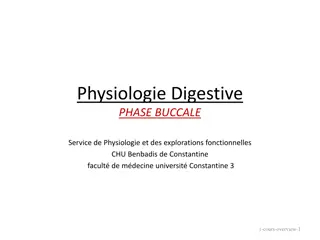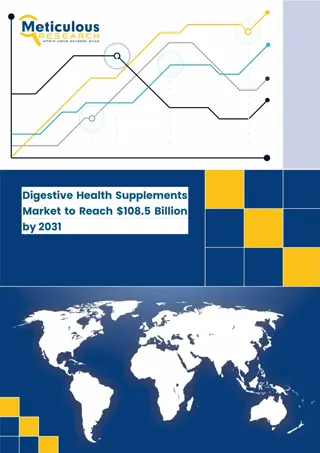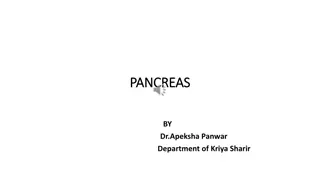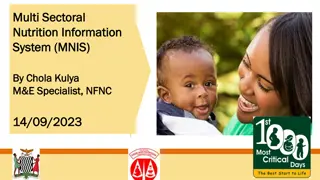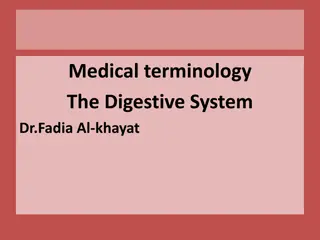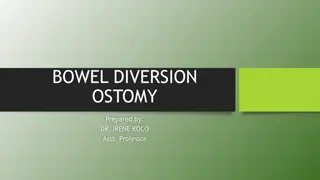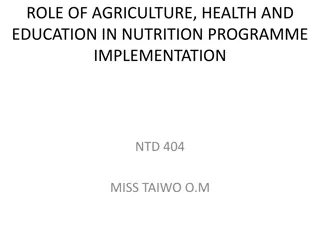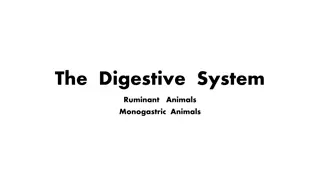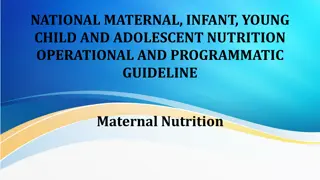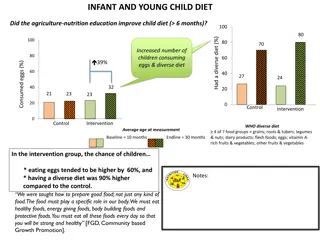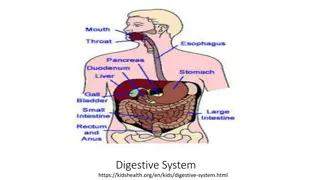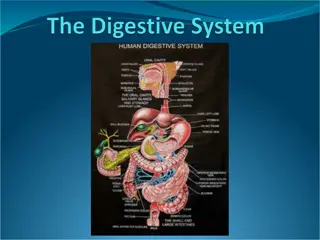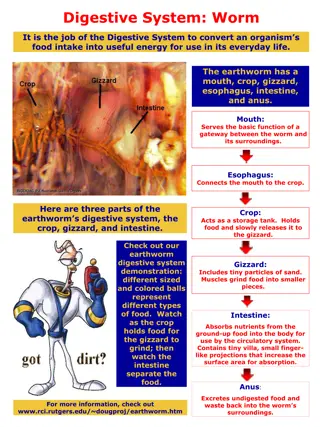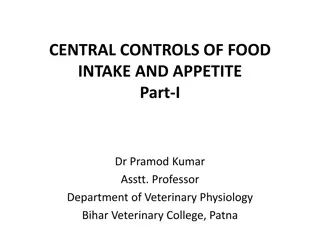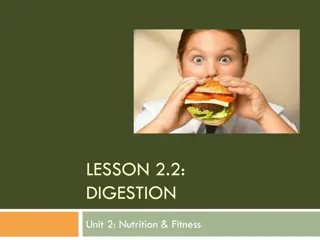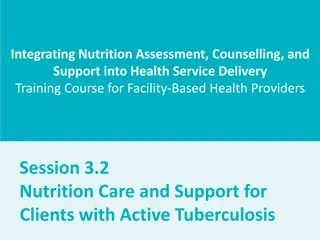Ostomy Diet and Nutrition Guidelines for Improved Digestive Health
Learn about the role of diet and nutrition in managing digestive health post-ostomy surgery. Clinical Dietitian Sucheta Vijay Limaye provides essential tips on low-roughage diets, managing short bowel syndrome, and meeting energy and protein requirements. Follow expert recommendations for optimal nutrition to support healing and prevent complications in the digestive system.
Download Presentation

Please find below an Image/Link to download the presentation.
The content on the website is provided AS IS for your information and personal use only. It may not be sold, licensed, or shared on other websites without obtaining consent from the author. Download presentation by click this link. If you encounter any issues during the download, it is possible that the publisher has removed the file from their server.
E N D
Presentation Transcript
Ostomy Diet and Nutrition By, Sucheta Vijay Limaye. M.Sc. Health Science (Dietetics) Consultant Clinical Nutritionist +919922008514 Deenanath Mangeshkar Hospital, Joshi Hospital
The digestive digestive tract is much more than simply a food food processing system. ... Westernization of our lifestyle has led us to increased incidences of GI disorders Sucheta Vijay Limaye, Clinical Dietitian. 9922008514.
Nutrients absorbed in Nutrients absorbed in our digestive system our digestive system Sucheta Vijay Limaye, Clinical Dietitian. 9922008514.
The first few weeks to a month after surgery, you'll likely be advised to eat a diet that is low in roughage. Limiting roughage allows the intestine time to heal and prevents blockage due to swelling. Sucheta Vijay Limaye, Clinical Dietitian. 9922008514.
Short bowel syndrome (S B S) A condition where section of small intestine is removed or by-passed due to disease, surgical complication or injury. The shortened length of intestine can create problems with digestion, absorption and stomy management. Sucheta Vijay Limaye, Clinical Dietitian. 9922008514.
ESPEN Guidelines for SBS Energy requirement : 30 - 35 Kcal/kg / day. Protein requirement : 1- 1.5 gm /kg / day. Patients with preserved colon should consume diet high in complex Carbohydrates and low in fats. Essential fatty acids and fat soluble vitamins need to be supplimented. DO NOT restrict milk if intolerance is not documented. Add soluble fiber. Use salt liberally. Limit use of tea, coffee, cola, alcohol, etc. In enteral tube feeds polymeric, isotonic formulas are recommended. Sucheta Vijay Limaye, Clinical Dietitian. 9922008514.
Colostomy or Colectomy Diet After Colostomy or Colectomy Diet After Surgery Surgery Sucheta Vijay Limaye, Clinical Dietitian. 9922008514.
The amount of food, its form, the frequency of feeding, and the composition of diet each have important effects on GI function and may be used to help ameliorate signs of GI disease disease. ... The appropriate diet may have a profound effect on intestinal and successful management management of chronic or severe GI disease disease. intestinal recovery Sucheta Vijay Limaye, Clinical Dietitian. 9922008514.
Need for a Special Colostomy or Need for a Special Colostomy or Colectomy Diet After Surgery Colectomy Diet After Surgery IV fluids for two to three days, to give the colon time to heal. Clear liquids, such as soup broth and juice, followed by easy-to-digest foods, such as rice, toast and oatmeal. Normal diet Avoid certain foods that cause odors or gas As these foods can over-inflate the colostomy bag and make it more difficult to manage. Sucheta Vijay Limaye, Clinical Dietitian. 9922008514.
Achievement of optimum calorie Achievement of optimum calorie and protein needs and protein needs Nutritional supplement Complete balanced nutrition Macro & micronutrient profile Can be used as supplemental or sole source of nutrition Approx 1 kcal/ml Low residue Lactose and Gluten free Sucheta Vijay Limaye, Clinical Dietitian. 9922008514.
Supplements that help Sucheta Vijay Limaye, Clinical Dietitian. 9922008514.
Low fiber , low residue diet First 6-8 weeks of post colonostomy . Easier to digest Will not over work the bowel during recovery Need to follow till swelling in bowel is reduced. Add a new food gradually, may be one food at a time. Sucheta Vijay Limaye, Clinical Dietitian. 9922008514.
Foods to Watch With a Colostomy Foods to Watch With a Colostomy Raw vegetables Skins and peels of fruit (fruit flesh is OK) Dairy products Very high fiber food such as wheat bran cereals and bread Beans, peas, and lentils Corn and popcorn Brown and wild rice Nuts and seeds Cakes, pies, cookies, and other sweets High fat and fried food such as fries , fried snacks, fried chicken, sausage, and other fatty meats, etc . Sucheta Vijay Limaye, Clinical Dietitian. 9922008514.
Foods That Help a Colostomy Foods That Help a Colostomy Yogurt (with live and active cultures) Cranberry juice Bananas Applesauce Well-cooked, sticky white rice Buttermilk Tapioca White toast Sucheta Vijay Limaye, Clinical Dietitian. 9922008514.
Why Chewing Is so Important After Colostomy Surgery Thoroughly chew everything you eat. Chewing is an important part of the digestive process and we all chew our food to some degree. Make a special effort to chew food very well, it helps to manage colostomy more easily. Try to chew everything until it's liquid in your mouth. Sucheta Vijay Limaye, Clinical Dietitian. 9922008514.
Making right food choices is very important Making right food choices is very important Nourishing foods and eat Food that is well tolerated Consistency of food. Sucheta Vijay Limaye, Clinical Dietitian. 9922008514.
Key Tips For first 1 year of recovery you may need to take multi- vitamin supplement. Eat variety of foods & try to introduce different foods. Eat at regular intervals & avoid fasting or skipping meals. 6-8 weeks after surgery begin to choose foods with dietary fiber. Lactose intolerance is common. Include all unsaturated fat & limit saturated fats, consult doctor if fat intolerance is present. Maintain adequate hydration. Sucheta Vijay Limaye, Clinical Dietitian. 9922008514.
Key Tips Eat regularly don t skip meals. Empty bowels produce gas. When adding new foods, try a little bit with other foods. Small frequent feeds are best always chew thoroughly. Rice, potatoes /pasta once daily may reduce frequency & irritation. High potassium foods will help offset the effects of diarrhea. Drink 6-8 glasses of liquid but not with the meal.. Avoid anal irritants : 1. Chinese/ oriental veg. 2. Coconut 3. Raw fruits ( orange, apple ) 4. Raw vegetables 5.Dry fruits (raisins, figs ) 6. Spicy foods 7. Foods with seeds & nuts Sucheta Vijay Limaye, Clinical Dietitian. 9922008514.
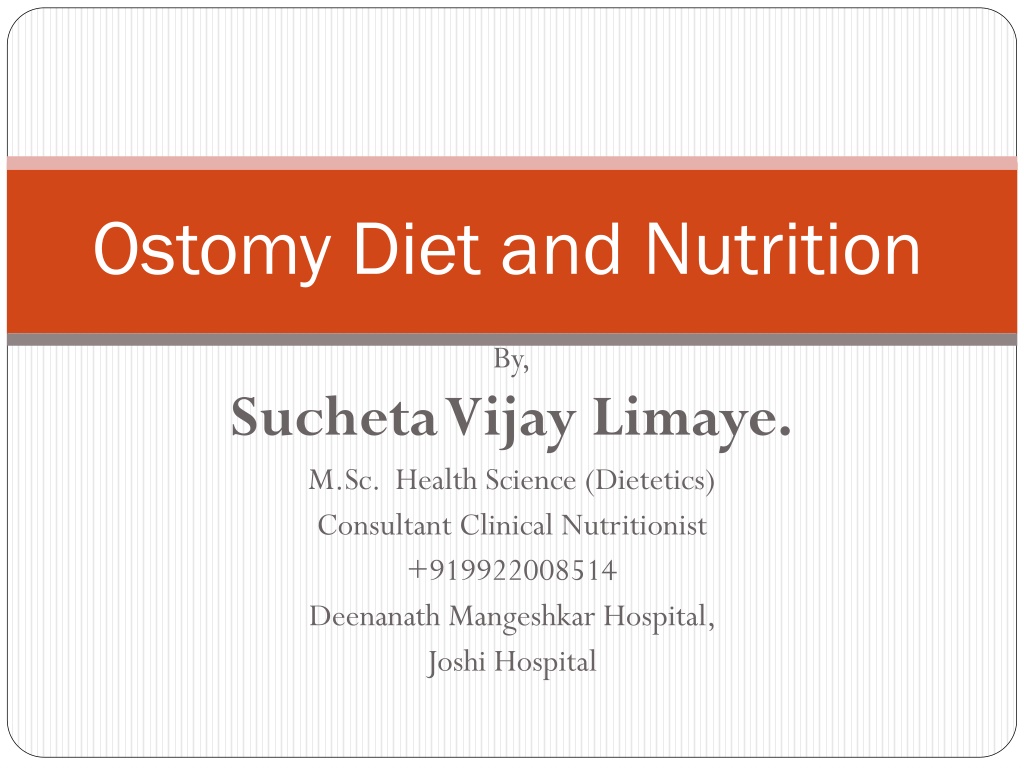

![READ [PDF] Dash diet Cookbook for beginners: 365 days of simple, healthy, low-s](/thumb/2057/read-pdf-dash-diet-cookbook-for-beginners-365-days-of-simple-healthy-low-s.jpg)

